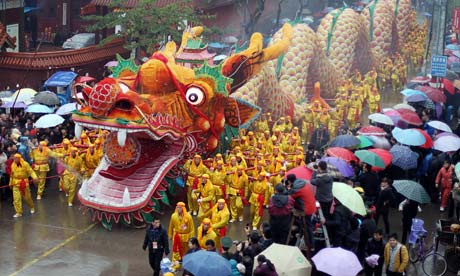The portents surrounding the visit to Washington next week of vice-president Xi Jinping, the man expected to become China's new "paramount leader", are not auspicious. The year of the dragon, just begun, may mark the moment when the aura of inevitability surrounding China's rise as leading global superpower is punctured, if not wholly dispelled.
A range of factors, including adverse economic trends, internal challenges to Communist party control and increasing American re-assertiveness suggests an unexpectedly rough ride ahead for Beijing's would-be masters of the universe. The furious row over China's veto of the proposed UN resolution on Syria is a taste of things to come.
Barack Obama's state of the union address vividly illustrated the more combative mood in the US towards a China that is daily accused by Republican presidential candidates of wilfully undermining American jobs and businesses and scheming to supplant the US as world No 1.
"I will not stand by when our competitors don't play by the rules. We've brought trade cases against China at nearly twice the rate as the last administration – and it's made a difference," Obama said to applause.
"But we need to do more. It's not right when another country lets our movies, music and software be pirated. It's not fair when foreign manufacturers have a leg-up on ours only because they're heavily subsidised."
Obama said he would create a trade enforcement unit specifically tasked with investigating unfair Chinese trade practices.
Falling demand in the US and recession-hit Europe has already had a seriously dampening effect on China's export-led economy and, despite a recent uptick in US performance, the outlook remains deeply uncertain.
Analysts often suggest China's massive foreign exchange reserves give it a huge potential cushion. It owns about $2tn (£1.25tn) in US treasury and mortgage-backed debt and $800bn in European bonds. But these holdings are a double-edged sword, as Minxin Pei, author of China's Trapped Transition: the Limits of Developmental Autocracy, noted. "If China threatens to reduce its investment in US debt, it will either have to find alternative investments (not an easy task these days) or export less to the US (not a good idea for Chinese manufacturers).
"With so much invested in western debt, China would suffer disastrous capital losses if it spooked financial markets," Minxin wrote.
This year is one of significant political transition in China as well as the US, with President Hu Jintao expected to step down early next year – and signs of Communist party nervousness abound.
The latest in a series of trials of dissidents charged with subversion took place in Hangzhou, eastern China. Veteran rights activist Zhu Yufu was accused of undermining state power by sending a poem and messages on Skype.
Such proceedings appear designed to pre-empt any political challenges as the Communist party changes guard.
Likewise, police forces in the restive western Xinjiang region, the scene of repeated violent ethnic strife involving the local Muslim population, are to be boosted by several thousand this year. A renewed crackdown on Tibetan activists has been underway for some time.
More mainstream challenges to Communist party hegemony stemming from China's 300 million-strong middle class may be brewing, Minxin suggested.
"At most, the Chinese middle class tolerates the status quo because it is a vast improvement over the totalitarian rule of the past, and because there is no practical or immediate alternative. But as the Arab spring shows, a single event or a misstep by authoritarian rulers can transform apathetic middle-class citizens into radical revolutionaries …
"Today, China's middle class is becoming more dissatisfied with inequality, corruption, unaffordable housing, pollution and poor services … the party knows it cannot bank on middle-class support."
Ironically, China's decision to allow uncensored coverage of January's Taiwan presidential poll, won by the pro-Beijing incumbent, may have backfired by sparking an impassioned mainland online debate about the advantages of democratic elections. This highlighted another uncomfortable reality for the Chinese leadership: more than 500 million Chinese have access to the internet and technologically evolving social media. Government controls cannot keep up and censorship is said to be increasingly ineffective.
Xi may have obliquely reflected ruling clique concerns about negative internal and external trends in a recent, remarkably conciliatory speech ahead of his meeting with Obama. "No matter what changes affect the international situation, our commitment to developing the Sino-US co-operative partnership should never waver in the face of passing developments," Xi said.
"In dealing with major and sensitive issues that concern each side's core interests, we must certainly abide by a spirit of mutual respect and handle them prudently, and by no means can we let relations again suffer major interference and ructions."
But the US is piling geopolitical on top of economic pressure: by exploring new or expanded military partnerships with the Philippines, Japan, Australia and Singapore; by reviving ties with Burma, China's long-time satellite; and by pressing for more responsible Chinese policy on North Korea, Syria and Iran.
All this is part of what Obama calls a "strategic shift" to the Asia-Pacific region after a decade of Middle Eastern preoccupations. What the Chinese military sees is a blatant attempt to encircle and contain China.
"We've made it clear that America is a Pacific power … America is back. Anyone who tells you otherwise, anyone who tells you that America is in decline or that our influence has waned, doesn't know what they are talking about," Obama said.
This is fighting talk. Obama, his heart set on a second term, has thrown down the gauntlet to China, which (Iran notwithstanding) is in danger of becoming the new US bogeyman. This is the backdrop to Xi's uncertain inheritance. Despite his conciliatory words, his Washington debut could produce fireworks.







